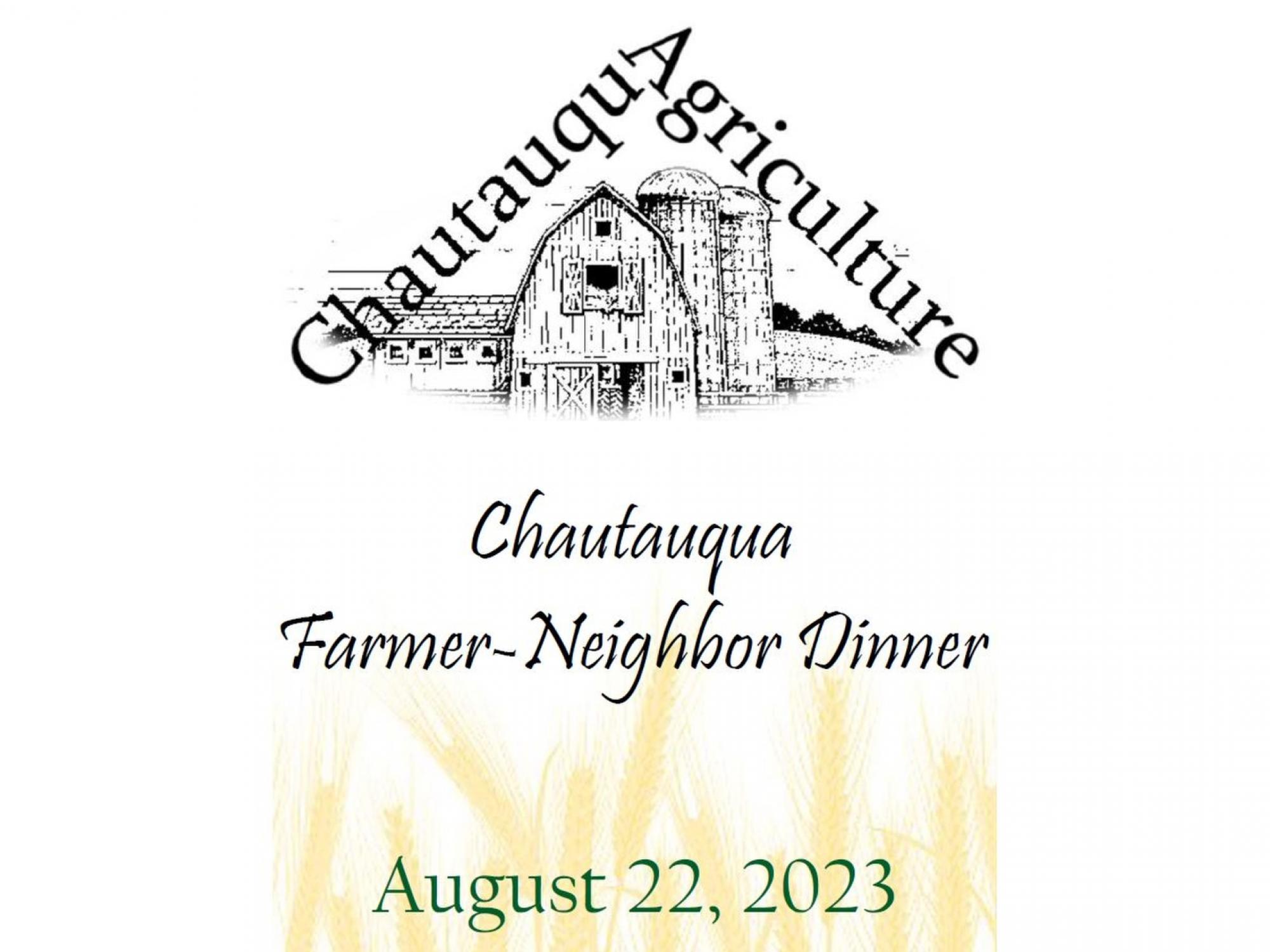VIDEO: Chautauqua County Agriculture Celebrated at the Farmer-Neighbor Dinner
VIDEO Chautauqua County


Chautauqua Farmer-Neighbor Dinner Celebrates Chautauqua County Agriculture

[embedded content]
Introduction
The 6th annual Chautauqua Farmer-Neighbor dinner took place at “The Grandview of Ellington” on August 23rd. The event aimed to promote communication between farmers and neighbors and educate the community about the farming industry in Chautauqua County. With over 225 attendees, the dinner showcased locally produced products, incorporating agricultural products from 36 local producers into the meal.
Speakers and Insights
Dennis Webster served as the Master of Ceremony for the event, providing insightful agricultural statistics for Chautauqua County. The speakers for this year’s dinner were Laine Carpenter, a fifth-generation farmer and 4-H member, and his grandfather Bob Carpenter. Their perspectives on agriculture offered attendees a glimpse into how the industry has evolved over the years while highlighting the skills and knowledge being passed down to future generations.
Awards for Excellence in Agriculture
The Chautauqua County Soil and Water Conservation District presented the Chautauqua County Agricultural Environmental Management Farmer of the Year award to Cabhi Farm, LLC of Clymer. Cabhi Farm, LLC has implemented various best management practices to protect natural resources and ensure the sustainability of the farming community.
The Chautauqua Farmer-Neighbor Committee also presented three awards during the event:
- The Friend of Agriculture Award was given to Clyde Rodgers, Rodgers & Sons, Inc. of Cherry Creek. Clyde, Jan, and their three sons have provided invaluable support to numerous producers by assisting with the purchase and servicing of agricultural equipment, educating the public at Ag Days, and supporting youth through participation in the 4-H auction.
- Roberto Fred of Roberto Fred Farms received the Legacy Producer Award. With over 35 years of farming experience, Roberto Fred Farm specializes in produce and actively participates in local farmer’s markets. Their commitment to resilience and community support was showcased in the documentary “Foodways; Stories of Farms, Food, and Resilience.”
- The Card Family of Moon Meadow Farm was honored with the Agricultural Impact Award. They established Moon Meadow Farm Custom Cuts and Butchering, a licensed kitchen that not only processes their own meat products but also supports other local producers. Their goal is to promote local livestock and provide customers with high-quality meats from trusted sources.
Supporting Sponsors and Producers
The success of this year’s event was made possible by the generous support of sponsors such as Chautauqua County Farm Bureau, Emma J. Brook Flower Farm, Farm Credit East, ACA, Sheriff Jim Quattrone, and others. The dinner also received contributions from local businesses including 3 C’s Catering, Good Grass Farm, Hillside Metal, and Knight Vineyards, LLC. The Chautauqua Farmer-Neighbor Dinner is an annual event that welcomes new sponsors and producers to contribute. Interested parties can contact Lauren Sharp at sharpl@chqgov.com to be added to next year’s contact list. The Chautauqua Farmer-Neighbor Committee is a collaborative effort between public and private businesses dedicated to supporting agriculture and local producers.
SDGs, Targets, and Indicators Analysis
1. Which SDGs are addressed or connected to the issues highlighted in the article?
- SDG 2: Zero Hunger
- SDG 12: Responsible Consumption and Production
- SDG 15: Life on Land
The article discusses the Chautauqua Farmer-Neighbor dinner, which aims to educate about the farming community in Chautauqua County and promote local agriculture. This aligns with SDG 2, which focuses on achieving zero hunger and promoting sustainable agriculture. The article also mentions the implementation of best management practices on farms to protect natural resources, which relates to SDG 12 on responsible consumption and production. Additionally, the recognition of a farm for its environmental management aligns with SDG 15, which aims to protect, restore, and promote sustainable use of terrestrial ecosystems.
2. What specific targets under those SDGs can be identified based on the article’s content?
- Target 2.4: By 2030, ensure sustainable food production systems and implement resilient agricultural practices that increase productivity and production.
- Target 12.4: By 2020, achieve environmentally sound management of chemicals and all wastes throughout their life cycle, in accordance with agreed international frameworks, and significantly reduce their release to air, water, and soil to minimize their adverse impacts on human health and the environment.
- Target 15.9: By 2020, integrate ecosystem and biodiversity values into national and local planning, development processes, poverty reduction strategies, and accounts.
Based on the article’s content, the targets mentioned above can be identified. The Chautauqua Farmer-Neighbor dinner promotes sustainable food production systems and resilient agricultural practices, contributing to Target 2.4. The implementation of best management practices on farms also aligns with Target 12.4, as it aims to achieve environmentally sound management of resources. Furthermore, the recognition of a farm for its environmental management reflects the integration of ecosystem and biodiversity values into local planning and development processes, supporting Target 15.9.
3. Are there any indicators mentioned or implied in the article that can be used to measure progress towards the identified targets?
- Number of local producers’ agricultural products incorporated into the meal
- Number of best management practices implemented on farms
- Recognition of farms for environmental management
The article mentions the incorporation of locally produced agricultural products into the meal, which can serve as an indicator of progress towards sustainable food production systems and resilient agricultural practices (Target 2.4). The implementation of best management practices on farms, as well as the recognition of farms for their environmental management, can also be used as indicators to measure progress towards environmentally sound resource management (Target 12.4) and the integration of ecosystem and biodiversity values into planning and development processes (Target 15.9).
4. Table: SDGs, Targets, and Indicators
| SDGs | Targets | Indicators |
|---|---|---|
| SDG 2: Zero Hunger | Target 2.4: By 2030, ensure sustainable food production systems and implement resilient agricultural practices that increase productivity and production. | Number of local producers’ agricultural products incorporated into the meal |
| SDG 12: Responsible Consumption and Production | Target 12.4: By 2020, achieve environmentally sound management of chemicals and all wastes throughout their life cycle, in accordance with agreed international frameworks, and significantly reduce their release to air, water, and soil to minimize their adverse impacts on human health and the environment. | Number of best management practices implemented on farms |
| SDG 15: Life on Land | Target 15.9: By 2020, integrate ecosystem and biodiversity values into national and local planning, development processes, poverty reduction strategies, and accounts. | Recognition of farms for environmental management |
Behold! This splendid article springs forth from the wellspring of knowledge, shaped by a wondrous proprietary AI technology that delved into a vast ocean of data, illuminating the path towards the Sustainable Development Goals. Remember that all rights are reserved by SDG Investors LLC, empowering us to champion progress together.
Source: chqgov.com

Join us, as fellow seekers of change, on a transformative journey at https://sdgtalks.ai/welcome, where you can become a member and actively contribute to shaping a brighter future.







